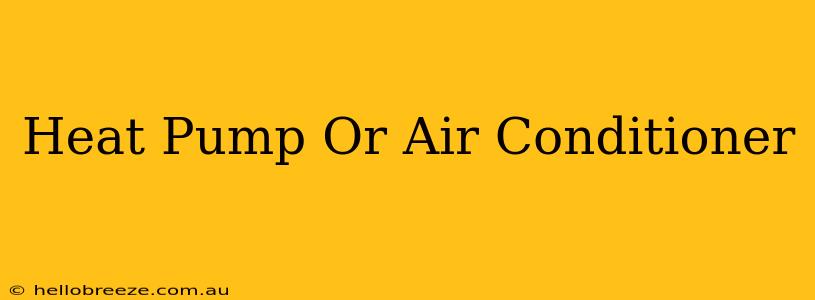Choosing between a heat pump and an air conditioner can feel overwhelming. Both systems control your home's temperature, but they work in fundamentally different ways, impacting efficiency, cost, and overall comfort. This comprehensive guide will help you understand the key differences and determine which system best suits your needs.
Understanding Heat Pumps
Heat pumps are incredibly versatile. Unlike air conditioners that only cool, heat pumps can both heat and cool your home. They achieve this by moving heat rather than generating it. In cooling mode, they extract heat from inside your home and release it outside. In heating mode, they reverse the process, drawing heat from the outside air (even in relatively cold temperatures) and transferring it inside.
Advantages of Heat Pumps:
- Energy Efficiency: Heat pumps are significantly more energy-efficient than traditional electric resistance heating systems, often resulting in lower energy bills. They leverage readily available heat from the environment, reducing the amount of energy needed to heat your home.
- Dual Functionality: One system handles both heating and cooling, simplifying your HVAC system and potentially reducing maintenance costs.
- Environmentally Friendly: Because they are more energy efficient, they generally have a smaller carbon footprint compared to systems relying solely on electricity for heating.
- Quiet Operation: Many modern heat pumps operate at a quieter decibel level than traditional air conditioners.
Disadvantages of Heat Pumps:
- Performance in Extreme Cold: While advancements have improved their cold-weather performance, heat pumps may be less efficient in extremely frigid temperatures. Supplemental heating might be necessary in very cold climates.
- Higher Initial Cost: The upfront cost of purchasing and installing a heat pump is often higher than a comparable air conditioner.
- Potential for Frosting: In very cold and humid conditions, the outdoor unit can experience frosting, which can temporarily reduce its efficiency.
Understanding Air Conditioners
Air conditioners are designed solely for cooling. They work by using a refrigerant to absorb heat from the indoor air and release it outside. This process lowers the indoor temperature, providing relief from the summer heat.
Advantages of Air Conditioners:
- Lower Initial Cost: Generally less expensive to purchase and install than a heat pump.
- Simple Operation: Simpler to understand and operate compared to a heat pump's dual functionality.
- Reliable Cooling: Proven technology providing consistent and reliable cooling performance.
Disadvantages of Air Conditioners:
- No Heating Capability: They only cool; you'll need a separate heating system (like a furnace) for the winter months.
- Higher Energy Costs (Heating): If relying on electric resistance heating, expect higher energy bills during colder months compared to heat pump heating.
- Less Environmentally Friendly (Heating): Electric resistance heating is less energy efficient and contributes more to carbon emissions than heat pump heating.
Making the Right Choice: Heat Pump or Air Conditioner?
The best choice depends on several factors:
- Your Climate: In milder climates, heat pumps excel. In extremely cold climates, a heat pump might need supplemental heating, potentially negating some energy savings.
- Your Budget: Consider both the upfront installation costs and long-term energy savings.
- Your Home's Heating Needs: If you need a dedicated heating system already, an air conditioner is sufficient for cooling.
- Environmental Concerns: Heat pumps are generally the more environmentally friendly option due to their higher energy efficiency.
Ultimately, consulting with a qualified HVAC professional is crucial. They can assess your specific needs, evaluate your home's characteristics, and recommend the most efficient and cost-effective system for your situation. Don't hesitate to ask about rebates and incentives available for energy-efficient systems in your area. Investing in a well-chosen system will provide comfort and long-term value.

